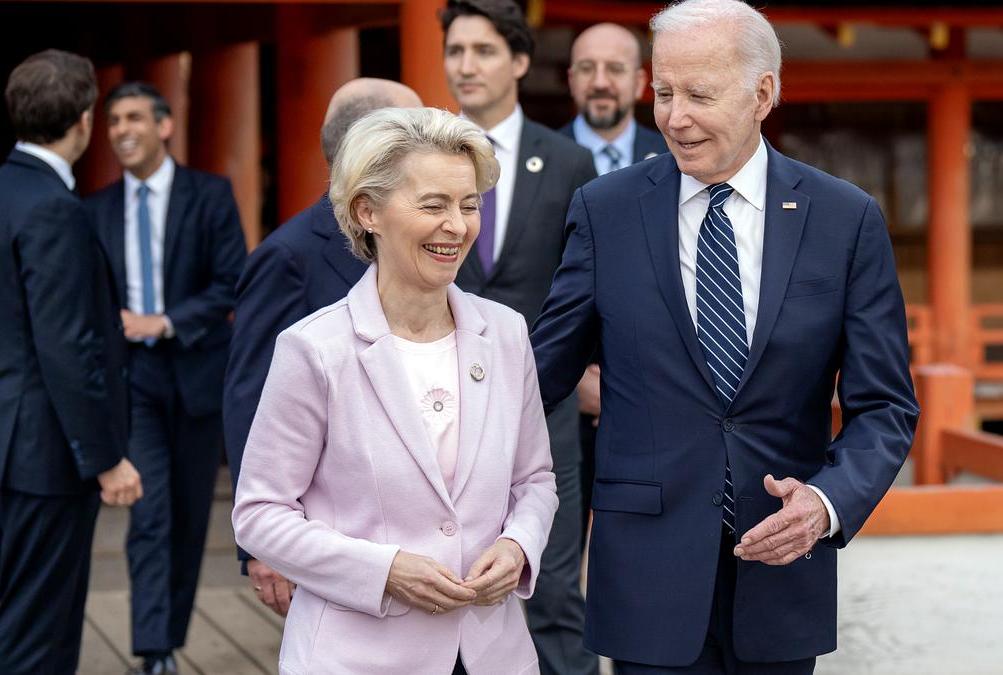
James F. Downes, Assistant Professor, Head of Politics and Public Administration Programme, Hong Kong Metropolitan University
Mathew Y. H. Wong, Assistant Professor, Education University of Hong Kong
Man Hoo So, Master's Candidate, European Political Economy, London School of Economics and Political Science
Jun 09, 2023
James F. Downes, Mathew Wong and Man Hoo So argue that the EU-China relationship has evolved considerably over recent years into a growing global rivalry in 2023. They argue that whilst the EU has become more interventionist towards China in 2023, there exists large divisions within the core EU institutions alongside EU member states towards relations with China.

Wang Lei, Assistant Research Fellow, Institute of World Political Studies, CICIR
Sun Ru, Research Professor & Deputy Director, CICIR
Jun 08, 2023
Adjustments in European and American strategies may offer hope for a return to normal relations with China. The EU and U.S. should dump their political prejudices against China, take care of the common security of the world, try to remove risks and truly cooperate with China.
Sebastian Contin Trillo-Figueroa, Geopolitics Analyst in EU-Asia Relations and AsiaGlobal Fellow, The University of Hong Kong
Jun 06, 2023
Europe is altering its China policy to reduce reliance on vital technologies, while seeking a balance between protecting its interests and fostering cooperation. And by shifting the relationship, we have the opportunity to heal divisions, and prioritize shared interests that have been, expressed, ultimately benefiting everyone involved.
Jade Wong, Senior Fellow, Gordon & Leon Institute
May 04, 2023
Chinese President Xi Jinping’s outreach to the president of Ukraine, Volodymyr Zelenskyy, could be a game-changer. The call was welcomed by Zelenskyy, who called it “long and meaningful.” As Beijing steps into its role as a global peacemaker, the world is taking notice.
Sebastian Contin Trillo-Figueroa, Geopolitics Analyst in EU-Asia Relations and AsiaGlobal Fellow, The University of Hong Kong
May 03, 2023
The EU’s pursuit of becoming an autonomous and influential global power, while balancing relationships with the U.S. and China, was jolted by the Russian invasion of Ukraine. The EU aims to collaborate and compete as an equal with both powers, while improving its domestic strength, ensuring reciprocity, and linking trade to geopolitics, foreign policy, and security. And the Comprehensive Agreement on Investment, executing the EU strategy in Asia and the Indo-Pacific, and establishing a collective defense structure with operational objectives, are three projects that could help achieve these goals.
Wu Baiyi, Former Director of the Institute of European Studies, Chinese Academy of Social Sciences
May 03, 2023
Europe faces three imperatives: It needs to seize the opportunity presented by China’s post-pandemic reopening; it needs China as a stabilizer, in light of the unpredictable prospect of peace in Eastern Europe; and it needs to rebalance its relationship with the United States because of dramatic international shifts in recent years.
Brian Wong, Assistant Professor in Philosophy and Fellow at Centre on Contemporary China and the World, HKU and Rhodes Scholar
Apr 24, 2023
China’s latest diplomatic win, an expansive agreement with France, goes a long way in confirming China’s dream of becoming a global hegemon. Yet with conflict raging in Europe to this day, the end of the road is nowhere near.

Philip Cunningham, Independent Scholar
Apr 24, 2023
China has kick-started a phase of public-facing diplomacy overtures, encompassing Europe, the Middle East, and its own situation with Taiwan. The wave of meetings and visits shows a remarkable change in China’s reception from the international community, as well as where it might still improve its relations.

Jade Wong, Senior Fellow, Gordon & Leon Institute
Apr 12, 2023
French President Emmanuel Macron and European Commission President Ursula von der Leyen clearly signaled that trade, not ideology, will continue to anchor China-EU relations. Even so, the Russia-Ukraine conflict could complicate matters if not resolved.
Sebastian Contin Trillo-Figueroa, Geopolitics Analyst in EU-Asia Relations and AsiaGlobal Fellow, The University of Hong Kong
Apr 04, 2023
The EU and U.S. recently announced a deal providing America favorable treatment to European critical materials. The agreement will deepen cooperation and decrease their dependency on China, but potential consequences remain uncertain. In the future, the EU should adopt a more ambitious stance to strengthen their position as a self-reliant and influential global geopolitical force, as they navigate the delicate balance between Beijing and Washington.